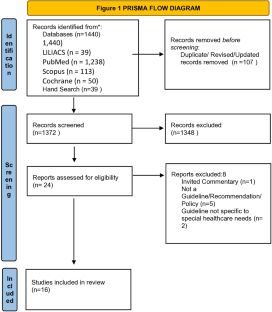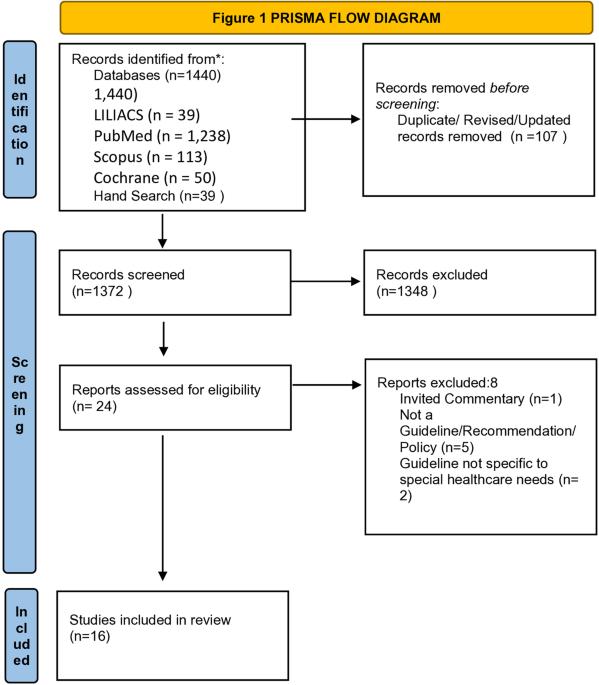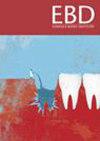针对有特殊保健需求的儿童的全球口腔保健政策和建议及其在 COVID -19 大流行期间的适用性和有效性:系统性回顾。
Q3 Dentistry
引用次数: 0
摘要
目的:本系统性综述旨在评估在 COVID-19 期间,口腔卫生政策、建议和指南在保障有特殊医疗需求的儿童的口腔健康方面的有效性:本系统性综述评估了在 COVID-19 大流行期间针对有特殊医疗保健需求的儿童(SHCN)的全球口腔健康政策的适应性,以便在持续的全球健康危机中为政策制定者和医疗保健提供者提供基于证据的见解。研究重点在于评估这些调整在确保这一弱势群体公平获得高质量牙科保健方面的有效性:在 PRISMA 的指导下,对 LILIACS、PubMed、Scopus、COCHRANE 和灰色文献进行了在线搜索。搜索策略结合了与 "口腔健康"、"牙科健康"、"政策"、"有效性"、"牙科实践指南"、"口腔健康政策 "和 "有特殊护理需求的儿童 "相关的主题词(MeSH 术语)和自由文本术语。资格标准包括针对有特殊护理需求的个人/儿童的口腔健康政策、建议和指南。2008年至2023年期间用英语发表的定性和定量研究均包括在内:结果:确定了来自六个机构的 16 份指南、建议和政策。这些文件涉及六个不同的领域,大致包括全面护理、伦理考虑、预防和治疗措施、公平、以患者为中心的治疗以及减少差异,这标志着一种模式的转变。国际合作和指导方针的标准化表明了一种统一的方法。审查还强调了通过质量测量、系统化转诊管理和需求评估不断改进的承诺。除两份文件外,其余指南均未涉及 COVID-19 或对其进行具体调整。值得注意的是,这些指南没有强调个人情况,因为它们通常对有特殊医疗保健需求的个人采取了更为普遍的方法:总之,本综述评估了 COVID-19 对有特殊需求者口腔保健的影响。它强调了全球和地方为实现公平获取、以患者为中心的护理和预防措施所做的努力。汲取的经验教训倡导建立一个能够满足不同需求的弹性、包容性医疗保健框架:普罗斯佩罗注册号:CRD 42023452475。本文章由计算机程序翻译,如有差异,请以英文原文为准。


Global oral health policies and recommendations for children with special health care needs and their applicability and effectiveness during the COVID -19 pandemic: a systematic review
This systematic review aims to assess effectiveness of oral health policies, recommendations and guidelines in safeguarding oral health of children with special healthcare needs during COVID-19. This systematic review evaluated the adaptation of global oral health policies for children with special healthcare needs (SHCN) during the COVID-19 pandemic, to provide evidence-based insights to inform policymakers and healthcare providers amid the ongoing global health crisis. The study focused on assessing the effectiveness of these adaptations in ensuring equitable access to quality dental care for this vulnerable group. A PRISMA guided online search through LILIACS, PubMed, Scopus, COCHRANE and grey literature was conducted. The search strategy incorporated a combination of subject headings (MeSH terms) and free-text terms related to “oral health,” “dental health,” “policy,” “effectiveness,” “dental practice guidelines,” “oral health policies,” and “special care needs children.” Eligibility criteria included oral health policies, recommendations and guidelines targeting individuals/children with special care needs. Both qualitative and quantitative studies published in English from 2008 to 2023 were included. Sixteen guidelines, recommendations and policies, from six authorities were identified. These documentations addressed six different areas mentioned broadly as comprehensive care, ethical considerations, preventive and therapeutic measures, equity, patient-centric treatment, and reducing disparities signaling a paradigm shift. International collaborations and standardization of guidelines indicated a unified approach. The review also emphasized on a commitment to continuous improvement through quality measurement, systematic referral management, and needs assessment. With the exception of two documents, the remaining guidelines did not address COVID-19 or provide specific adaptations for it. The lack of emphasis on individual condition was notable, as the guidelines generally took a more generalized approach toward individuals with special healthcare needs. In conclusion, this review assessed the impact of COVID-19 on oral healthcare for individuals with special needs. It underscores global and local efforts for equitable access, patient-centric care, and preventive measures. The lessons learned advocate for a resilient, inclusive healthcare framework capable of meeting diverse needs. CRD 42023452475.
求助全文
通过发布文献求助,成功后即可免费获取论文全文。
去求助
来源期刊

Evidence-based dentistry
Dentistry-Dentistry (all)
CiteScore
2.50
自引率
0.00%
发文量
77
期刊介绍:
Evidence-Based Dentistry delivers the best available evidence on the latest developments in oral health. We evaluate the evidence and provide guidance concerning the value of the author''s conclusions. We keep dentistry up to date with new approaches, exploring a wide range of the latest developments through an accessible expert commentary. Original papers and relevant publications are condensed into digestible summaries, drawing attention to the current methods and findings. We are a central resource for the most cutting edge and relevant issues concerning the evidence-based approach in dentistry today. Evidence-Based Dentistry is published by Springer Nature on behalf of the British Dental Association.
 求助内容:
求助内容: 应助结果提醒方式:
应助结果提醒方式:


